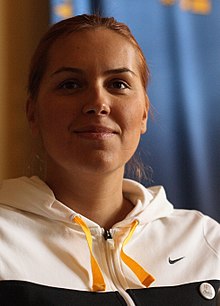This article needs additional citations for verification. (May 2010) |
| Part of a series on the |
| Culture of Ukraine |
|---|
 |
| Cuisine |


Sports in Ukraine as in any other country throughout the World plays an important role in shaping the popular view of Ukraine and Ukrainian popular culture to its residents and the rest of the World. Sports in Ukraine while it is voluntary and spontaneous, it is regulated and standardized by the government and respected government agency as well as legislation. According to the Law of Ukraine "About physical culture and sports", sports is an activity of subjects of the sphere of physical culture and sport directed to identification and the unified comparison of achievements of people in physical, intellectual, and other preparation by holding sports competitions and preparation for them. The sport has such directions: children's sports, sports for children and young people, reserve sports, elite sports (sports of higher achievements), professional sports, sports of veterans of physical culture and sport, veterans of war, the Olympic sport, not Olympic sport, office and applied and military and applied sport, sports of persons with disability and so forth.[1][2]
Being dominated by Russia since the 18th century, sports in the bigger portion of Ukraine as the rest of popular culture in Ukraine has been overshadowed by Russian culture as its regional deviation. As part of Ukrainian culture, sports began its development in Austria-Hungary and were influenced by various European physical culture movements such as pan-Germanic Turners, pan-Slavic Sokol movement, and others (such as all-Jewish Maccabiah sports). In the Russian Empire, the Ukrainian nation was never recognized and was criminally prosecuted, while the Little-Russian culture was allowed to exist only as folk culture. Only after dissolution of the Soviet Union, in 1992 the Ukrainian anthem first sounded at Olympic Games starting with the Olympic victory of Oleh Kucherenko and immediately followed by victories of Tetiana Hutsu and Oleksandra Tymoshenko.[3][4][5]
Football and wrestling have been popular in Ukraine since the 19th century.[6] Ukraine has benefited from the Soviet Union's emphasis on physical education, and Ukraine was left with hundreds of stadiums, swimming pools, gymnasiums, and other athletic facilities after the collapse of the Soviet Union.[7] Ukraine sports or athletic movements were influenced greatly by the Sokol gymnast organization that was popular in the Central Europe since the second half of the 19th century.
Sport in Ukraine is primarily governed by 40 federations of various Olympic sports that are all part of the National Olympic Committee of Ukraine (NOC Ukraine), which in its turn is part of the International Olympic Committee (IOC). The mass sports movement is driven by four main sports societies (i.e. Dynamo – Ukraine) and two government sports committees of the Ministry of Education and the Armed Forces of Ukraine (CSC AF Ukraine), all of which are also collective members of the National Olympic Committee.
All non-Olympic sports are governed by their respective federations of the Sports Committee of Ukraine.
Ukraine also has a strong paralympic team.
- ^ LAW OF UKRAINE: About physical culture and sport. cis-legislation.com. December 24, 1993
- ^ Law of Ukraine: About Physical Culture and Sport. www.global-regulation.com.
- ^ Olha Modina. The "Nezalezhny" Ukrainian sport: from the first anthem at Olympics to the youngest champion of Europe («Незалежний» український спорт: від першого гімну на Олімпіаді до наймолодшого чемпіона Європи). Radio Liberty. 24 August 2019
- ^ When did at first actually sounded the Ukrainian anthem at Olympics (Коли насправді вперше пролунав Гімн України на Олімпіаді). Espreso.tv. 28 July 2015
- ^ The 1992 Ukraine's Olympic medalists. "Forum, a Ukrainian review" at Diasporiana.
- ^ "Sports in Ukraine, sporting nation — My Ukraine". Archived from the original on 2019-06-30. Retrieved 2010-05-05.
- ^ Ukraine :: Sports and recreation - Britannica Online Encyclopedia